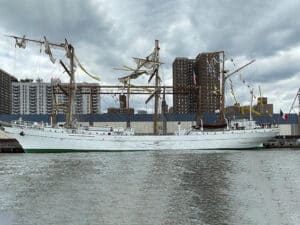
Longitude Engineering to take eSOV design to next level
Written by Nick Blenkey
Image: Latitude Engineering
London-headquartered Longitude Engineering has been selected to design the world-first zero-emission electric Service Operation Vessel (eSOV) that a consortium led by Bibby Marine plans to build (see earlier story). The project has recently been awarded GBP 20 million (about $25 million) in U.K. government funding under the Zero Emission Vessel and Infrastructure (ZEVI) competition.
The eSOV is based on Longitude Engineering’s OSD-IMT9605 design. The vessel will be powered by a hybrid 20MWh battery system and dual-fuel methanol generators for back-up and offshore charging capability.
The vessel will provide ultra-low emission support to offshore construction, operations and maintenance activities in the offshore renewables sector in the U.K. and elsewhere in Europe, in particular supporting Europe’s growing offshore wind market.
Having developed the concept for the consortium, Longitude Engineering is developing the design to Approval in Principle level for verification of the energy storage system and methanol system philosophy. This phase also includes design development and support for shipyard pricing.
“Whilst development of our renewable energy infrastructure increases, decarbonising the wider project value chain is also of critical importance to further move the dial on our race to net zero,” says Dean Goves, maritime design director at Longitude Engineering. “Studies have been conducted to explore the carbon footprint of marine operations in offshore wind construction. This project is the next step – engineering a solution. It has the opportunity to set the tone for future enhanced decarbonisation of vessels involved in offshore operations,”
Bibby Marine CEO, Nigel Quinn said: “As we announced back in September, we are building the world’s first eSOV. This project is the natural progression of our decarbonization journey, as we aim to operate a low or no carbon emission vessel by 2026.
“Designed in the U.K., the vessel will be a game-changer for our industry, and we are delighted to work alongside some of the market leading contractors and suppliers on this project, such as Longitude. Longitude’s expertise in specialised vessel design is vital to us realising our net zero goals and getting our eSOV in the water.”

Longitude Engineering will apply a multi-disciplined engineering and marine consultancy team to work on this project, including naval architects, master mariners, electrical engineers, specialists in methanol and energy storage solutions, structural engineering, hydrodynamics, marine engineering and more.
A member of Oslo-listed energy and marine consultancy group ABL Group ASA, Longitude Engineering has a track-record of over 100 vessels constructed to its designs across a range of marine sectors. The company’s capabilities were enhanced in 2021 through the acquisition of ship design bureau OSD-IMT.
In addition to Bibby Marine, the consortium behind the eSOV includes the Port of Aberdeen, ORE Catapult, Kongsberg, DNV, Shell and Liverpool John Moores University.




